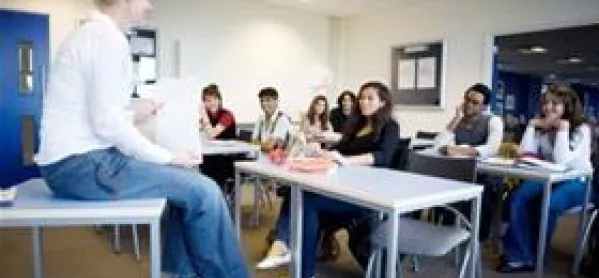Classroom teachers ‘denigrated’

Plans to change the role of chartered teachers by requiring them to make an “enhanced contribution” to schools have been branded a “Trojan horse” which would allow headteachers to take advantage of them.
A draft code of practice on the way forward for the controversial post, which was designed to reward excellence for teachers intending to remain in the classroom, is to be considered next week by the Scottish Negotiating Committee for Teachers. It lists the activities which might be expected of them to “make a distinctive contribution to the school or education community”. Headteachers and directors of education have long demanded that chartered teachers should put themselves at the disposal of their school.
However, the Scottish Secondary Teachers’ Association claims the guidance will give heads, who it claims are already putting pressure on chartered teachers, carte blanche to load additional responsibilities on them.
It says the document, which has been seen by The TESS, flies in the face of the original purpose of the post, which was to acknowledge the worth of classroom teachers. There are currently 750 chartered teachers in Scotland.
The Educational Institute of Scotland, which dominates the teachers’ side of the tripartite SNCT, has yet to endorse it officially.
The guidance stresses that the chartered teacher “remains primarily a classroom teacher and at no point should be regarded as a management post”.
But SSTA members voted unanimously, in an emergency motion at their annual congress in Peebles last week, to reject “attempts to expand chartered teachers’ duties . by suggesting an enhanced contribution”.
Delegates dismissed it as a “stitch-up” and a “Trojan horse”.
The chartered teacher role “restored dignity to the classroom”, said incoming president Peter Wright, but the SNCT proposals were “denigrating to classroom practice”.
The draft code outlines five “professional actions” that might be undertaken by chartered teachers:
- leading or contributing to projects - for example, introducing small- scale projects to initiate change, such as eco schools or citizenship;
- developing aspects of the curriculum and leading curricular change and assessment in the school, such as trialling and evaluating A Curriculum for Excellence, alternative methodologies or resources and new technology;
- supporting, advising and mentoring colleagues, including probationers, students or under-performing teachers;
- leading in-service on research work or educational development: a chartered teacher should “be able to direct colleagues towards current educational thinking, writing and research”, as well as supporting the school improvement plan by carrying out research;
- developing relationships in school and beyond, such as through cross- curricular or cross-sectoral initiatives, or partnerships with parents.
Annie McSeveny, chair of the Association of Chartered Teachers in Scotland, welcomed the document’s recognition of the value of chartered teachers. Speaking in a personal capacity, she said the guidance might cause problems if it was misinterpreted as listing all the things a chartered teacher should do. It was examples of things they might do: “What needs to be flagged up more is the individual nature of their contribution.”
Ms McSeveny did not agree with the SSTA that it would give heads freedom to take advantage; the complaint was that heads did not use their expertise sufficiently.
Walter Humes, research professor in education at the University of the West of Scotland, also felt the SSTA’s fears were “unjustified”. The union’s position was “dated” because it took a “hierarchical view” of schools, that all leadership roles should be invested in those who held management posts. It was not inconceivable that a head could take advantage of a chartered teacher’s expertise for management purposes, but such action would be “unwise” and “counterproductive”, he added.
The proposals contained good aspects, such as regarding chartered teachers as sources of ideas for the school, contributors of research insights, links to teacher education institutions and mentors for probationers. He was “less keen” on tying them into “bureaucratic arrangements” for professional review and development and school improvement plans.
The SNCT was charged by Education Secretary Fiona Hyslop with issuing guidance on the chartered teacher’s role. This, with the General Teaching Council for Scotland’s Revised Standard for Chartered Teachers, to be published next month, would, she said, let “those aspiring to the grade know what is expected”.
Keep reading for just £1 per month
You've reached your limit of free articles this month. Subscribe for £1 per month for three months and get:
- Unlimited access to all Tes magazine content
- Exclusive subscriber-only stories
- Award-winning email newsletters



